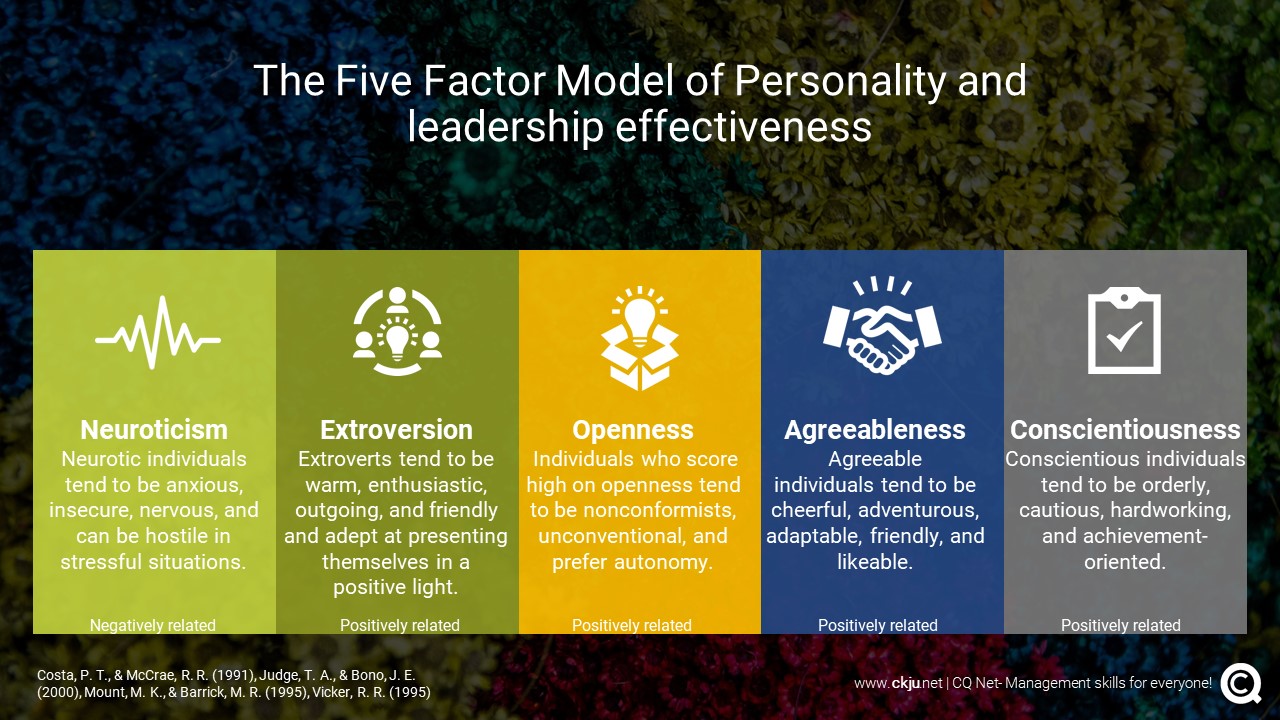- All Management Learning Resources
- trait based approach to leadership

Executive summary
This CQ Dossier discusses the trait-based approach to leadership and reviews those personality traits that distinguish effective from ineffective leaders. The dossier also identifies key skills or competencies that are related to leader effectiveness and can be used by organizations for selection, promotion, and training.
Contents
- Executive summary
- Effective leadership is a question of selection and skill development
- Organizations should focus on leadership selection and skill development
- Several of the Big Five personality traits are related to leadership effectiveness
- Skill theories emphasis more malleable characteristics of leadership effectiveness
- Problem solving, social judgement and knowledge are key abilities of effective leaders
- Organizations can utilize the trait-based and skill-based approach to identify and develop leaders
- Key take-aways
- References & further readings
Effective leadership is a question of selection and skill development
The question of whether leaders are born or made is a perennial argument among leadership scholars (Bass, 1990). In pondering this question, philosophers and scientists have argued either that genetics and stable dispositions are the foundation for effective leadership or that environmental opportunities contribute to leader emergence.
Organizations should focus on leadership selection and skill development
The preponderance of leadership courses suggests that many believe leadership can be created but the lack of rigorous longitudinal studies of leader development makes it difficult to obtain an accurate measure of how leaders are shaped (Conger, 1992). It is probably best for organizations to adopt an interactionist approach and create interventions that focus on both skill development and identification of individuals who demonstrate effective leader traits.
Several of the Big Five personality traits are related to leadership effectiveness
This CQ Dossier focuses on the Big-Five personality traits and reviews those traits that are related to leader effectiveness. In addition, the dossier reviews those skills that are related to leadership effectiveness so organizations can create meaningful training interventions that allow managers to hone and sharpen their leadership skills. There have been numerous reviews on which traits are related to leader effectiveness. Tim Judge and colleagues conducted a statistical review of the literature (meta-analysis) and found that several of the Big Five personality traits were related to leader effectiveness (Judge et al., 2002).
First, extroversion was positively related to leadership and represents the tendency to be sociable, assertive, active, energetic, and full of zeal (Judge et al., 2002). Extroverts tend to be warm, enthusiastic, outgoing, and friendly (Costa & McCrae, 1991). The strong interpersonal element associated with this personality trait demonstrates why extroversion is a valid predictor of leader effectiveness. Extroverts are also skilled in non-verbal communication, are effective speakers, and are also adept at presenting themselves in a positive light (Riggio, 1986).
Conscientious individuals are orderly, cautious, hardworking, and achievement-oriented (Mount & Barrick, 1995). Conscientiousness is comprised of two facets–achievement and dependability– and these interdependent facets are both related to leader effectiveness (Judge et al., 2002).
Agreeable individuals are cheerful, adventurous, adaptable, friendly, likeable, generous, tolerant, and courteous (Barrick & Mount, 1991). They are less apt to be rude and verbally aggressive. Agreeable individuals have empathy for others and are generally altruistic. In the meta-analysis conducted by Judge and colleagues there was no relationship between agreeableness and leader effectiveness. However, Judge and Bono (2000) found agreeableness was a predictor of transformational leadership, accounting for 7% of the variance in transformational leader behavior. In a review of empirical articles that focused on military performance, agreeableness emerged as a predictor of military leadership (Vickers, 1995).
Openness to experience has emerged as a broad construct, encompassing originality, curiosity, imagination, broadmindedness and intelligence (Mount & Barrick, 1995). Individuals who score high on openness to experience tend to be nonconformists, unconventional, and prefer autonomy. In the Judge meta-analysis, openness to experience was positively related to leader effectiveness.
Neurotic individuals tend to be anxious, insecure, nervous and apprehensive (Mount & Barrick, 1995). Neurotic individuals exhibit poor emotional adjustment and can be hostile in stressful situations. Not surprisingly, in the meta-analysis conducted by Judge and colleagues, neuroticism was negatively related to leader effectiveness (Judge et al., 2002).
Skill theories emphasis more malleable characteristics of leadership effectiveness
The research shows that the Big Five personality factors also refered to as the Five Factor Model of Personality are useful predictors of leader effectiveness and organizations can use these personality factors to identify, promote and train effective leaders. The Big Five are distal predictors of leader effectiveness. The research on individual characteristics and leadership effectiveness has also focused on more proximal, malleable characteristics of leadership. One of the issues with a focus on identifying traits associated with successful leadership is that traits are relatively fixed from an early age.
The skills theory of leadership grew from this flaw. There are several skills theories and they all focus on those characteristics that distinguished effective from ineffective leaders. One of the best known and well-validated theories is by Mumford and colleagues.
Problem solving, social judgement and knowledge are key abilities of effective leaders
The skills approach states that skills, knowledge, and abilities are required for a leader to be effective (Mumford et al., 2000). This approach suggests that many people have leadership potential and if they are given rich opportunities for development, they can become effective leaders.
This skills-based approach incorporates five elements as predictors of effective leadership:
- individual attributes,
- competencies,
- leadership outcomes,
- career experiences, and
- environmental influences.
However, the most important element is competencies incorporating ability in problem solving, social judgment, and knowledge. These three elements work together and separately to enable development of leader effectiveness.
Problem solving skills
Problem-solving skills are creative abilities that leaders utilize to solve ambiguous and difficult organizational problems. Leaders who are adept in problem-solving skills can define problems, gather information, and develop alternatives for solving the problem within the context of the organization.
Social judgement skills
Leaders with excellent social judgement skills can effectively work with others to lead change, solve problems, and make sense of issues. Leaders who have social judgment skills are adept in perspective taking, social perceptiveness, demonstrate behavioral flexibility, and social performance. Through perspective taking, effective leaders are empathic in solving problems and actively seek out knowledge regarding people.
Social perceptiveness
Effective leaders also demonstrate social perceptiveness through knowing how others will react in the midst of organizational change. They are also flexible in their behavior when confronted with other people’s attitudes and intended actions, understanding that there are many paths to achieve change. The social performance competency reflects being skills in several aspects of leadership, such as the ability
- to persuade and communicate the vision to others in the organization, and
- to mediate and to coach and mentor subordinates.
Knowledge and cognitive ability
This skills-based approach to leader effectiveness also acknowledges the importance of knowledge and cognitive ability to allow for leaders to show intelligence in making decisions regarding the firm. In addition, motivation and personality traits such as tolerance for ambiguity, creativity and curiosity are core characteristics for effective leadership (Mumford et al., 2000).
Organizations can utilize the trait-based and skill-based approach to identify and develop leaders
In conclusion, organizations can utilize the traits-based and skills-based approach to identify individuals who show leadership potential and develop their leadership skills. In addition, the trait-based approach to leadership also suggests that there are individuals who are not suited for leadership positions. There is considerable evidence available that individuals with a specific combination of dark personality traits can have a negative impact on an organization and their follower.
Key take-aways
- The traits-based approach to leadership is an important tool for organizations to select leaders
- The Big Five Personality traits can be used as a model for selection and training
- The Skills-based approach to leadership focuses on core competences that are more malleable and proximal than traits
- A skills-based approach allows organizations to identify and develop those individuals that demonstrate competencies of problem-solving, social judgement, and social competence
Management skills newsletter
Join our monthly newsletter to receive management tips, tricks and insights directly into your inbox!
References & further readings
Bass, B. M. (1990). Bass and Stogdill’s Handbook of Leadership: Theory, research, and managerial applications. 3rd edition. New York: Free Press.
Conger, J. A. (1992). Learning to Lead. San Francisco: Jossey-Bass Inc.
Costa, P. T., & McCrae, R. R. (1991). The NEO Personality Inventory Manual. Odessa, Florida: Psychological Assessment Resources.
Judge, T. A., & Bono, J. E. (2000). Five-factor model of personality and transformational leadership. Journal of Applied Psychology, 85, 751-765.
Judge, T. A., Bono, J. E., Ilies, R., & Gerhardt, M. W. (2002). Personality and leadership: A qualitative and quantitative review. Journal of Applied Psychology, 87, 4, 765-780.
Riggio, R. E. (1986). Assessment of basic social skills. Journal of Personality and Social Psychology, 51, 3, 649-660.
Mount, M. K., & Barrick, M. R. (1995). The Big Five Personality dimensions. In K. M. Rowland & G. R. Ferris, (Eds.). Research in Personnel and Human Resource Management, 13, 153-200.
Mumford. M. D., Zaccaro, S. J., Harding, F. D., Jacobs, T. 0., & Fleishman, E. A. (2000). Leadership skills for a changing world: Solving complex social problems. Leadership Quarterly, 11, 1, 11- 35.
Vicker, R. R. (1995). Using personality assessment for leadership selection. Washington, DC: US Government Printing Office.
About the Author







